rosemary oil
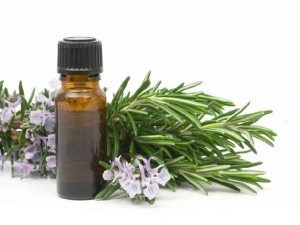
Rosemary used to make rosemary oil. It has a bright spicy smell, as well as useful and medicinal properties that are used in many areas.
Appearance and smell
- Essential rosemary oil has a fluid consistency. It may be colorless or have a slightly yellowish tint.
- By weight, the oil is quite light, but its aroma is so fresh, as if a leaf of rosemary was rubbed in your hands.
- The aroma of the oil includes invigorating minty and spicy woody notes with a slight hint of camphor. It also clearly felt the notes of freshly cut grass.
- The aroma is slightly bitter, but at the same time it creates a feeling of warmth and comfort.
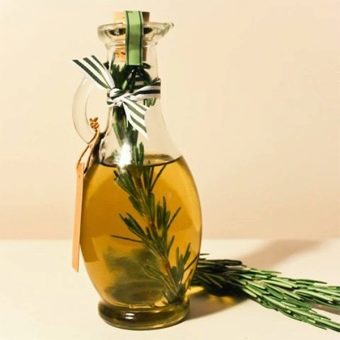
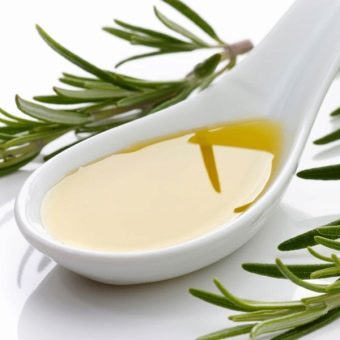
Kinds
Rosemary oil can have a different chemical composition, and depending on this, the following varieties are distinguished:
- borneol-camphor;
- cineole;
- verbenone.
Since rosemary oil is a frequent component of many cosmetics, the first variety is most suitable for oily or problematic skin care. For dry and aging skin, the latter type is used.
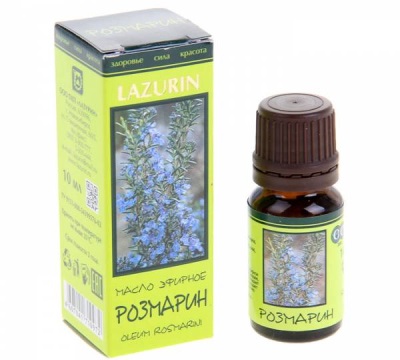
Oil production method
Rosemary essential oil is obtained by steam distillation. When extracting oil, the flowering tops of the plant and leaves are used. Mostly young plants are used. Rosemary is distilled without residue, as otherwise it will start to ferment, causing the aroma to be lost.

Beneficial features
Rosemary oil is a real storehouse of useful properties. These include the following:
- relieves spasms and pain;
- stimulates the nervous system;
- effective in skin care;
- eliminates old scars;
- actively used in hair care products;
- tones the body;
- improves concentration and memory;
- organizes thoughts;
- positively affects the emotional background;
- is a powerful aphrodisiac.
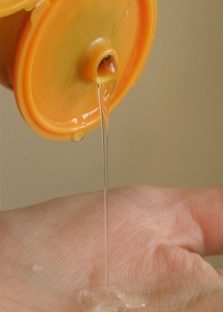
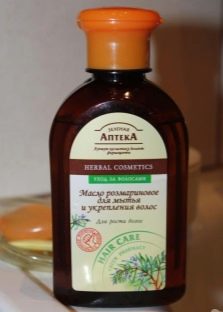
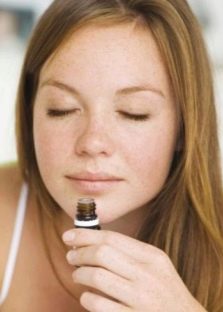
Harm
Possible negative consequences of excessive use of rosemary oil:
- sense of anxiety;
- burns;
- convulsions;
- spasmodic changes in pressure;
- dizziness.
Contraindications
It is not recommended to use rosemary oil in the following cases:
- with personal intolerance;
- pregnant women;
- persons with sensitive skin;
- in the presence of epilepsy;
- at elevated pressure;
- small children.
Before using rosemary oil, be sure to test for the presence or absence of allergies, otherwise unpredictable consequences may occur. It should also be borne in mind that rosemary oil should not be inhaled before going to bed, as it has an invigorating effect.
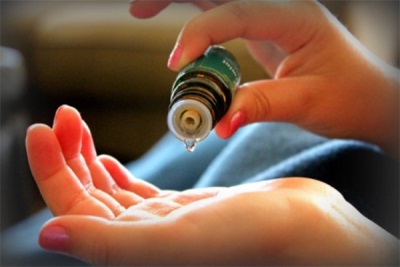
Application
In cooking
Rosemary oil in cooking has the following uses:
- acts as an additive to butter when roasting meat;
- added to marinades for meat and fish;
- used to make sauces.
Rosemary oil allows you to give the dish a rosemary smell, but it is not recommended to use it in large quantities.

In medicine
Rosemary oil is actively used in medicine due to its antimicrobial and anti-inflammatory action. It is a strong antispasmodic and antioxidant.
Rosemary oil is used in the following situations:
- to improve blood flow;
- to strengthen blood vessels;
- to improve vision;
- for the treatment of hemorrhoids;
- to increase pressure in hypotension;
- to relieve inflammation of blood vessels with varicose veins;
- to relieve muscle spasms and increase muscle elasticity;
- to improve the functioning of the digestive tract;
- to relieve swelling;
- as a choleretic and diaphoretic;
- to reduce the risk of atherosclerosis;
- to relieve headaches;
- as a powerful antiseptic;
- to strengthen the immune system;
- for the treatment of respiratory diseases;
- as a means of increasing lactation;
- to normalize the menstrual cycle;
- to accelerate the healing of wounds and ulcers.
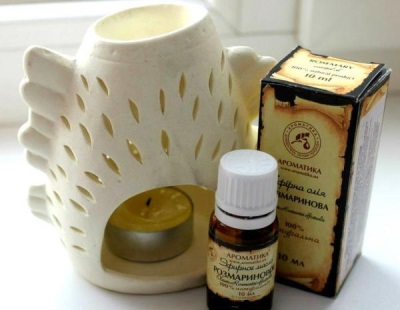
Rosemary oil is used as compresses, as well as in aroma lamps and inhalations.
For an aroma lamp in a small room, just a few drops of essential oil are required. For inhalation, a couple of drops are used for 1.5 liters of water. For oil compresses, ordinary vegetable oil (a tablespoon) is used as the base, to which 4 drops of rosemary oil are added.
To take a bath, it is enough to add 5 drops of oil, but if you are not used to, the procedures can cause dizziness at first. You can also use rosemary oil for massage, for this, vegetable oil is again used as a base, to which 5-6 drops of rosemary are added. This mixture is also great for rubbing.

In cosmetology
For hair
Rosemary oil is actively used for hair, it effectively fights dandruff and helps accelerate hair growth. With the constant use of rosemary oil, the hair will become softer and thicker. They will be less prone to oiliness, since the active substances contained in the oil will regulate the work of the sebaceous glands. Oil is added both to ready-made hair masks and to homemade ones.
For oily hair use the following method: add 5-6 drops of rosemary oil and okotea oil, as well as 3-4 drops of lemon and carrot oils to a regular shampoo. Wash your hair with the resulting product 3 times a week.
To fight dandruff mix a tablespoon of burdock oil with 7-8 drops of rosemary. The mixture should be rubbed into the roots of the hair, and then wrap the hair with a film or towel for a while.
For dry and split hair recommend making a mask of rosemary and olive oils. They are mixed in a ratio of 1: 1.5 and applied to the hair.

For skin
Rosemary oil is effectively used to care for problem skin.
It helps:
- narrow pores,
- restore the normal functioning of the sebaceous glands.
- reduce skin rashes, acne,
- restore water balance and even out the tone of the face.
It is useful to use rosemary oil for aging skin, as it allows you to smooth out wrinkles, eliminate age spots, and also make the skin more tender and soft.
Dry skin rosemary oil masks based on olive, linseed or apricot are recommended. And if you add a few drops of rosemary oil to ready-made masks, then their action will be much more effective.
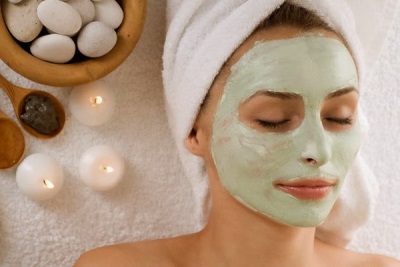
For oily skin use a mask of a couple of drops of rosemary oil and a teaspoon of grape seed oil. The mask is applied to the face and washed off with water after half an hour.
In undiluted form, the oil cannot be used, so it is better to dilute it with vegetable oil. A universal mask for improving the skin implies that you need to mix a teaspoon of vegetable oil with a couple of drops of rosemary. A similar composition is applied to problem areas of the skin.
To get rid of unwanted blemishes or healed scars mix rosehip oil with rosemary.Applying this mask twice a day will noticeably improve the skin.
For weight loss
Rosemary oil is an active participant in the fight against excess weight, as it can effectively eliminate cellulite. It is necessary to add a few drops to the massage agent and rub it into the right places. Daily use of this method will make the result noticeable after two weeks. Oil is also suitable for wrapping, so that the skin becomes more elastic, even. In combination with almond oil, you can get rid of not only cellulite, but also stretch marks.



















I like to add rosemary oil to various creams or even use it in its pure form. It smells good, and the skin is transformed from it.